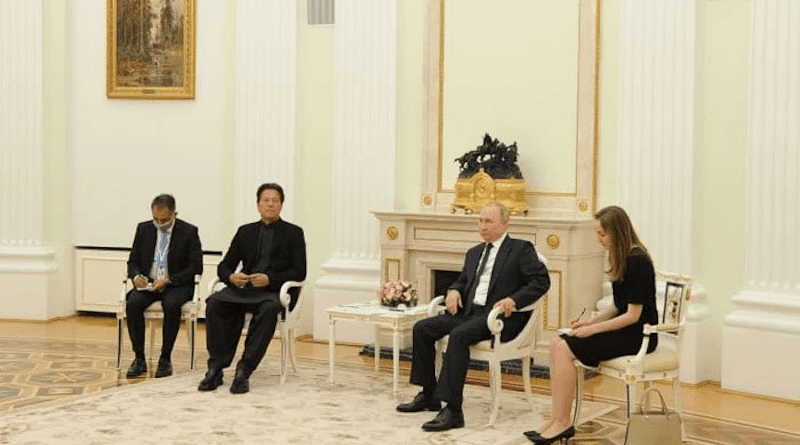United States Is Pushing Pakistan To Embrace Russia – OpEd
By Qudrat Ullah
After the fall of Soviet Union, the United States left Pakistan alone to deal with what had remained in Afghanistan. The Mujahideen, stinger missiles and mines were left behind and Pakistan was there to clear the mess. In 2009, Hillary Clinton, former State Secretary, in a Congressional hearing on former President Obama’s foreign policy, acknowledged that after the Soviets left, U.S. abandoned Pakistan. The then administration stopped dealing with Pakistan’s military, blaming that U.S. had provided military support for Pakistan but they had not changed the paradigm.
After the 9/11 attacks, Pakistan became a non-NATO ally of U.S. and fought its “War on Terror” and experienced the worst form of terrorism in Islamabad’s history. After two decades of war, in August 2021, Taliban forced takeover of Kabul and the hasty U.S. withdrawal pushed Pakistan again to the times of fall of Soviet, to deal with what was left in Afghanistan. Pakistan as a responsible country has done beyond its capacity and resources to fight terrorism, but again it was abandoned by Washington.
Since President Biden took office, he has not interacted with Prime Minister Imran Khan, which itself is an indication that nothing has left to discuss with Pakistan, despite being a strategic ally. The recent visit of PM Imran Khan to Moscow, just at the time of Russia-Ukraine tensions, was criticized, though it was already planned. PM Khan’s visit had nothing to do with either Russia-Ukraine conflict or the emergence of new Cold War. Pakistan is pressed with economic challenges and the anticipated cooperation with Russia on energy and on Afghanistan situation were key items to be discussed with Russian President Vladimir Putin.
President Putin welcomed Pakistan’s Prime Minster in Kremlin on the day of its invasion on Ukraine. U.S. State Department stated that it shared concerns with Pakistan and that every country around the world would make that point clearly in unambiguous language, in their engagements with Russian Federation.
But on 26 February when U.S. moved a resolution to condemn Russia for its invasion of Ukraine, India, for the second time, remained abstained and Biden administration said that “India’s relationship with Russia is distinct from that U.S. shares with the latter and that is okay”.
The duality of U.S. policies regarding Pakistan and India are explicit and Pakistan being close friend of China, and India being the member of QUAD, has swayed Washington’s diplomatic approach in the favor of New Delhi. Pakistan, despite of domestic pressure and international concerns, went on for its diplomatic rapprochement with Russia. It’s not Pakistan, but U.S. which is pushing Islamabad to renew its relations with Moscow and the visit itself was a signal to U.S. and the West that we cannot keep looking towards you for strong relations.
President Biden is diplomatically shunning Pakistan, and has pressurized the country by keeping it in Financial Action Task Force (FATF) Gray List and has imposed strict measures through International Monetary Fund (IMF). U.S. continued sidelining has pushed Islamabad to renew relations with Russia which can provide what Pakistan needs, investment and energy resources. The U.S. history, which Hillary Clinton spoke of in 2009 that U.S. has record of moving in and out of Pakistan, has made it clear that Islamabad will not join any camp and wants an greater independence in pursuing relations. The same move towards Russia is now driven more by a reduced engagement of the West with Pakistan.
The U.S. is dealing Pakistan in the prism of Afghanistan and with this single lens the relations will further deteriorate instead of improving. After August 2021, Pakistan has expedited its efforts for aid in Afghanistan and even has called Organization of Islamic Cooperation (OIC) summit in Islamabad to rally the Muslim countries to play their role in providing relief in Afghanistan to save them from the worst humanitarian crisis of their history.
The threat of terrorism in Afghanistan still persists and Ken McCallum, Head of MI5, said he is concerned about ‘terrorist infrastructure and networks reconstituting’ in Afghanistan months after the West’s withdrawal. The same concerns were shared in 14th report of the Secretary-General that terror groups enjoy greater freedom in Afghanistan than at any time in recent history. The threat needs to be addressed and eventually U.S. has to step in as it will pose a threat to not only the region but the whole world and Pakistan again will be approached for its help in fighting the renewed threats. But Russia-Ukraine Conflict has entirely shifted the focus of U.S., EU and other nations towards it and as feared it will not be settle down in near future, the terror organizations will find the opportunity to assert their presence.
Washington’s skewed relations with other nations will push not only Pakistan but also other countries close to Russia and the current global scenario is clearly indicating that new world order is taking place.
*Qudrat Ullah is a freelancer and media activist. He writes on political developments and security issues with special focus on South Asia and the region.

